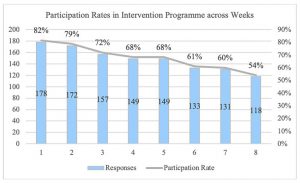Improve Psychological Health at Work with Mindfulness
By John M. de Castro, Ph.D.
“Mindful working means applying focus and awareness to everything you do from the moment you enter the office. Focus on the task at hand and recognize and release internal and external distractions as they arise. In this way, mindfulness helps increase effectiveness, decrease mistakes, and even enhance creativity.” – Rasmus Hougaard
Work is very important for our health and well-being. We spend approximately 25% of our adult lives at work. How we spend that time is immensely important for our psychological, social, and physical health. But, nearly 2/3 of employees worldwide are unhappy at work. This is partially due to work-related stress which is epidemic in the western workplace. Almost two thirds of workers reporting high levels of stress at work. This stress can result in impaired health and can result in burnout; producing fatigue, cynicism, and professional inefficacy.
To help overcome unhappiness, stress, and burnout, mindfulness practices have been implemented in the workplace. Indeed, mindfulness practices have been shown to markedly reduce the physiological and psychological responses to stress. As a result, it has become very trendy for business to incorporate meditation into the workday to help improve employee well-being, health, and productivity. These programs attempt to increase the employees’ mindfulness at work and thereby reduce stress. It is not known, however, how mindfulness and its benefits grow over training
In today’s Research News article “An App-Based Workplace Mindfulness Intervention, and Its Effects Over Time.” (See summary below or view the full text of the study at: https://www.frontiersin.org/articles/10.3389/fpsyg.2021.615137/full?utm_source=F-AAE&utm_medium=EMLF&utm_campaign=MRK_1616048_69_Psycho_20210504_arts_A) Lu and colleagues recruited participants online to an online mindfulness training (Awakened Mind) once a week for 8 weeks. They were measured before and after each weekly session for mindfulness, emotional exhaustion, work engagement, and job satisfaction.
They report that over training mindfulness significantly increases and was associated with higher levels of work engagement and job satisfaction and lower levels of emotional exhaustion. Multilevel growth level analysis revealed that amount of time in training significantly increased mindfulness and it, in turn, increased work engagement and job satisfaction and decreased emotional exhaustion. They also report that the rate of growth in mindfulness significantly slowed over the 8 weeks of training.
Previous research has demonstrated that mindfulness training improves work engagement and job satisfaction and reduces emotional exhaustion. The contribution of the present study was to document the growth of mindfulness and its impact on work over 8 weeks of online training. Not surprisingly, the growth in mindfulness was relatively rapid at the beginning of training and slower toward the end of the 8 weeks of training. So, further training produces diminishing returns.
The mindfulness training was online and thus did not interrupt the participants’ work. This is important as employers are reluctant to take time away from work for mindfulness training. Having it occur online allows the participants to schedule it at their own convenience without disrupting work and also greatly increases its availability to large numbers of workers at low cost. Online training, then, is an almost ideal method of training workers in mindfulness and thereby improve their psychological state at work.
So, improve psychological health at work with mindfulness.
“To be mindful at work means to be consciously present in what you’re doing, while you’re doing it, as well as managing your mental and emotional state.” – Shamash Alidina
CMCS – Center for Mindfulness and Contemplative Studies
This and other Contemplative Studies posts are also available on Google+ https://plus.google.com/106784388191201299496/posts and on Twitter @MindfulResearch
Study Summary
Lu Y, Remond J, Bunting M, Ilies R, Tripathi N and Narayanan J (2021) An App-Based Workplace Mindfulness Intervention, and Its Effects Over Time. Front. Psychol. 12:615137. doi: 10.3389/fpsyg.2021.615137
We investigated the week-to-week effects of a mindfulness intervention on emotional exhaustion, work engagement, and job satisfaction in a field study involving 218 participants who participated and reported their weekly outcomes during the 8-week program. To examine how mindfulness impacted work outcomes, we used intraindividual modeling of the 8-week data. Mindfulness increased over time, and time also had indirect effects on emotional exhaustion, work engagement, and job satisfaction, through mindfulness. Supplementary growth curve analyses on the improvement of mindfulness over time showed a slight decrease in the positive effect of time on mindfulness.
